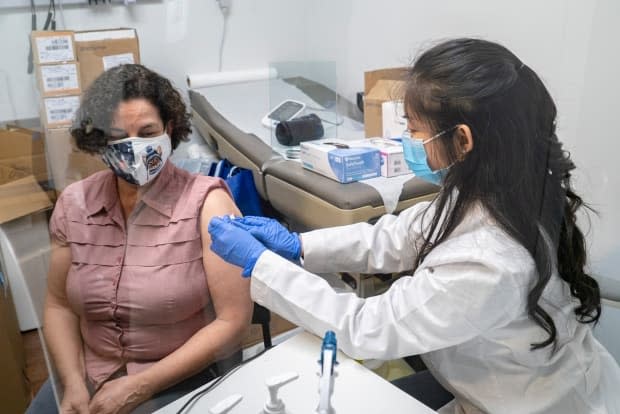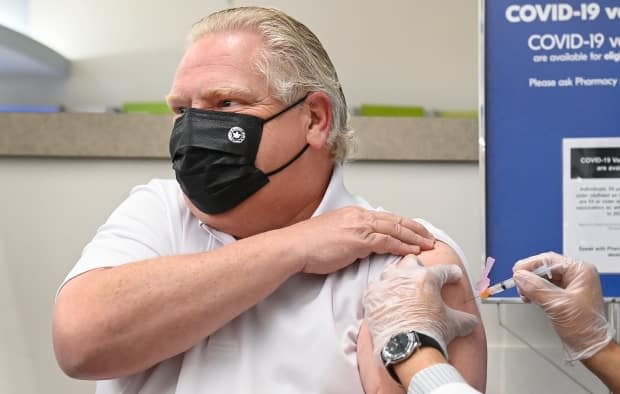'Nothing stopping' Ontario from expanding AstraZeneca eligibility: federal government

The federal government says Ontario is free to expand eligibility for the AstraZeneca vaccine to any adult over the age of 18 as pharmacists warn they have doses sitting idle because of the age restrictions.
"Provinces and territories are free to use AstraZeneca in any population over 18 per Health Canada's license for use in Canada," federal Health Minister Patty Hajdu told reporters on Sunday.
"There's nothing stopping the province of Ontario from changing their advice for use within Ontario."
Before Hadju's comments, Premier Doug Ford's office said it was waiting for a federal decision before expanding AstraZeneca eligibility from its current 55 and older age restriction, even as it stressed the need for an urgent increase in vaccine supply.

"While we wait for a federal decision on the lowering of the age limit for AstraZeneca, and in response to the latest cut in Moderna shipments, the Premier has begun reaching out to consulates to try and secure more vaccine supply for Ontario from our international allies," said Ford's press secretary Ivana Yelich.
"Vaccines are our only way out of this pandemic and the Premier will exhaust every avenue he has in order to get more needles into arms of Ontarians sooner."
Each province has the power to change the age range for eligibility at any time regarding vaccines. The National Advisory Committee on Immunization (NACI) only makes recommendations.
As Ontario battles the growing third wave of the pandemic, — with 4,250 new COVID-19 cases and 18 more deaths on Sunday — Ontario Pharmacists Association CEO Justin Bates urged the government to act now.
"Our view is it is a safe and effective vaccine and the benefits outweigh the risks," said Bates.
"We think it's important to lift the age restriction, prioritize essential workers and get this out to as many people as possible. We don't want wastage."
The association's call is echoed by doctors across Canada who say they also want the AstraZeneca age criteria to drop to 35 or 45 years of age. Both Quebec and Alberta said this past week they're considering this change.
NACI recommended earlier this spring that AstraZeneca be limited to people aged 55 and older after a small number of younger people in Europe developed a serious blood-clotting condition. The odds of getting a blood clot are estimated to be between one in 100,000 and one in 250,000.
NACI is now reviewing updated information from Health Canada. The health agency announced this week that it has determined AstraZeneca is safe and will not be restricting its use in any specific populations.
People begging to be vaccinated, pharmacist says
Toronto pharmacist Kyro Maseh has 160 AstraZeneca doses sitting in his pharmacy's fridge set to expire next month, he told CBC News Sunday morning.
He said he is running out of patients over the age of 55 to vaccinate but under the province's current rules, he must continue to turn away younger people desperate for a shot.
"I've had several people who broke down and cried in my pharmacy and begged me to vaccinate them because they're fearful to go to work and I can't do anything about it," said Maseh. "We're not helping anyone if we're giving some people two doses and then other people nothing."
People 55 and under are usually working and therefore vulnerable to contracting COVID-19, Maseh said. He added that those under 50 have limited options to get vaccinated: they must live in a hotspot and be able to attend a mobile or pop-up clinic.
When these vulnerable people come to his pharmacy hoping to get vaccinated, Maseh said he has to turn them away.
"I tell them to hold on and wait and hopefully the rules change," he said. "There's nothing more that I can do. Leadership needs to come from the ministry."
Maseh said the ideal scenario is that vaccines are made available to all adults and that pharmacies are allowed to administer Pfizer and Moderna shots as well.
"We have the capacity to do so," Maseh said.
It also makes the most sense, he said.

 Yahoo Movies
Yahoo Movies 